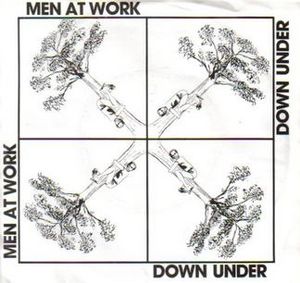Down Under (song) facts for kids
Quick facts for kids "Down Under" |
||||
|---|---|---|---|---|

7" Australian single
|
||||
| Single by Men at Work | ||||
| from the album Business as Usual | ||||
| B-side | "Crazy" (AUS/NA) "Helpless Automaton" (EU) |
|||
| Released | 2 November 1981 | |||
| Genre | ||||
| Length | 3:42 | |||
| Label | Columbia | |||
| Songwriter(s) | ||||
| Producer(s) | Peter McIan | |||
| Men at Work singles chronology | ||||
|
||||
"Down Under" is a famous song by the Australian rock band Men at Work. It was first released in 1980 as the B-side to their song "Keypunch Operator". This was before the band signed with Columbia Records.
The band's founders, Colin Hay and Ron Strykert, wrote both early songs. The first version of "Down Under" sounded a bit different from the one released later. The most famous version came out in 1981. It was the third single from their first album, Business as Usual.
The song became a huge hit around the world. It reached number one in Australia in December 1981. Then it topped the charts in New Zealand in February 1982. In Canada, it hit number one in October 1982. In the United States, "Down Under" reached number one in January 1983. It stayed there for four weeks and sold over two million copies.
In the UK, the song was number one in January and February 1983. It's the only Men at Work song to reach the UK top 20. The song also hit number one in Denmark, Ireland, Italy, and Switzerland. It was a top 10 hit in many other countries. "Down Under" is seen as a patriotic song in Australia. It's still very popular and is often played at sports events. In 2018, it was ranked number 2 on Triple M's "Ozzest 100" list of 'most Australian' songs.
Contents
Copyright Lawsuit: The "Kookaburra" Connection
In 2007, a TV quiz show called Spicks and Specks asked a question. It was "What children's song is in 'Down Under'?" The answer was "Kookaburra". This song's rights were owned by Larrikin Music. After the show, Larrikin Music decided to take legal action. They sued Colin Hay and Ron Strykert, who wrote "Down Under".
Why the Lawsuit Happened
Parts of the flute melody in "Down Under" were found to be similar to "Kookaburra". "Kookaburra" was written in 1932 by Marion Sinclair. The producer of "Down Under", Peter McIan, said the flute part was a "musical joke" by the flautist, Greg Ham. You can even see Greg Ham sitting on a gum tree in the song's music video while playing the flute part.
Marion Sinclair passed away in 1988. The rights to the "Kookaburra" song were then transferred to Larrikin Music in 1990.
Court's Decision
In June 2009, Larrikin Music sued Men at Work for copyright infringement. They claimed that the flute riff in "Down Under" copied from "Kookaburra". On February 4, 2010, a judge ruled that Larrikin's copyright had been broken. The court decided that "Down Under" used a "substantial part of 'Kookaburra'".
Larrikin Music asked for a share of the royalties from "Down Under". Royalties are payments made to the owner of a copyright for the use of their work. On July 6, 2010, the judge decided that Larrikin should receive 5% of the royalties from 2002 onwards. In October 2011, Men at Work lost their final appeal in court.
Before this case, many people thought "Kookaburra" was a traditional song that anyone could use. This was because its copyright status wasn't widely known. The lawsuit made people realize it was copyrighted. This led to some negative reactions from the Australian public.
New Version by Colin Hay
Colin Hay made a new version of "Down Under" in 2012. This was to celebrate 30 years since the original song came out. An Australian company, Telstra, asked for it to use in an advertisement during the 2012 Summer Olympics. The song was available on iTunes starting July 31, 2012.
In this new version, Colin Hay purposely changed the flute part. He did this to avoid any more copyright issues like the lawsuit.
See also
 In Spanish: Down Under (canción) para niños
In Spanish: Down Under (canción) para niños
 | Emma Amos |
 | Edward Mitchell Bannister |
 | Larry D. Alexander |
 | Ernie Barnes |

